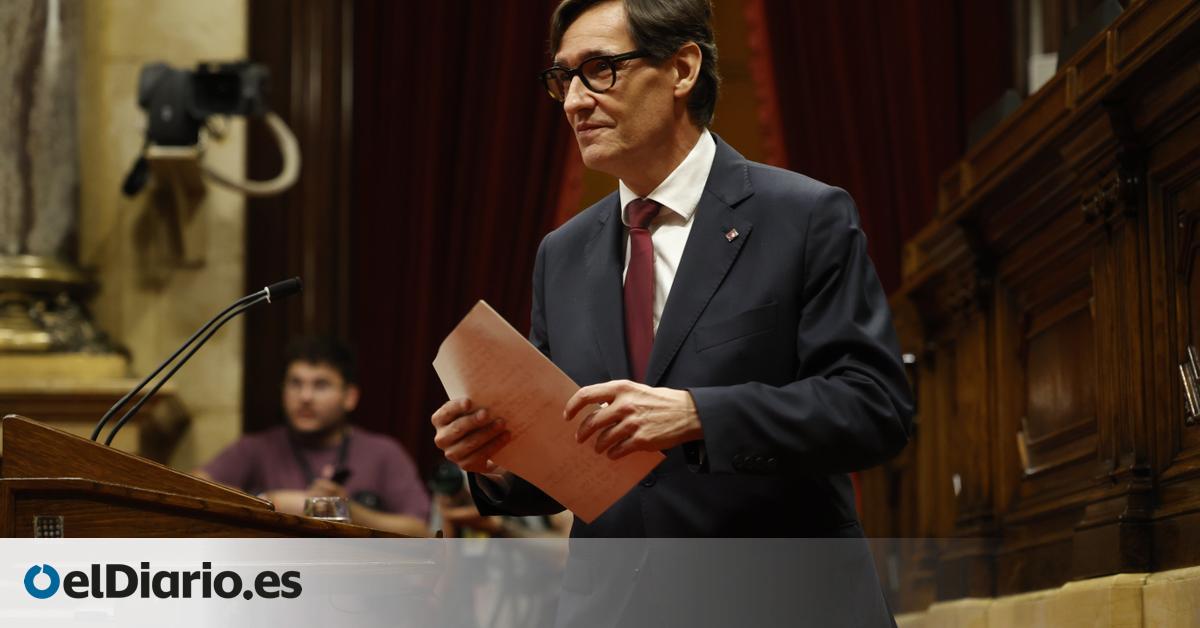
Salvador Illa did not expect to end the day as president of the Generalitat and had already assumed that he would have to wait a few more days. But Catalan politics is an enemy of predictions. The socialist has ended up being invested as president of the Generalitat this Thursday, the thirteenth democratic one since Francesc Macià, thanks to an absolute majority formed by his own party, ERC and Comuns. The PSC thus regains the Government after 13 years and with the aim of opening a new stage after the procés.
In his speech, which lasted just over 40 minutes, in which he asked for the support of the House, the now president thanked his investiture partners, ERC and Comuns, for the agreements signed with both. Illa took the opportunity to show his total commitment to the pacts that brought him to the Palau de la Generalitat and that were resolved after a particularly tough negotiation for ERC, due to the rejection of a large part of its members.
Of the agreements reached, Illa has highlighted the defence of “singular financing”, in reference to the Republicans, and of “left-wing taxation”, as a nod to the Comuns.
Illa has made it clear from the start of the plenary session that he understands the weakness with which his Government was born. The agreements signed, he indicated, “are for investiture, not for legislature” and that is why he said he is aware that he will need to continue looking for allies for each new step he wants to take. “I will do so,” promised Illa, who announced that he wants to “extend his hand” to all groups, including Junts, the CUP or the PP, but has explicitly left out those who use “hate speech,” that is, Vox and Aliança Catalana.
In his turn to respond, Albert Batet, leader of Junts, which will be the main opposition group, has attacked Illa for being a “branch president”. An epithet that he has justified because the agreements thanks to which he has been invested depend on compliance in Congress, not in Parliament, as he has argued.
But Batet has focused especially on ERC, whom she has accused of having “assumed the theses of the PSC” and having abandoned the independence conviction.
For its part, ERC has assured that its vote is a “vigilant yes” to Illa, which can only be consolidated if the socialist government fulfils its commitments. A similar idea to that of the Comuns, who have highlighted the agreements in social terms that they have reached but have also regretted not having reached consensus on matters such as the expansion of the airport. “We will be the opposition in these areas,” warned Jéssica Albiach.
Puigdemont takes the spotlight
“Catalonia must look forward, it cannot waste time and it must count on everyone,” Illa proclaimed before the House. A phrase that could be read in a social key, along the lines of “we will not leave anyone behind” that he has said on other occasions, but also directed at a pro-independence social mass that feels very far from this investiture but which Illa has tried not to upset with his words from the lectern.
But a significant part of the independence movement was waiting on Thursday for another less official but equally historic event: the return of Carles Puigdemont to Catalonia after seven years without setting foot there.
The former president’s return was taken for granted, after having promised it several times, as was his arrest, which was a procedure that the Mossos could not skip. If this arrest occurred, the coalition formed around Illa’s investiture, made up of PSC, ERC and Comuns, had agreed that they would allow the suspension of the parliamentary debate, always with the red line that there would be a date to resume it.
The surprise occurred shortly before 10 a.m., minutes after Puigdemont appeared, energetic but clearly nervous, at the event that brought together his followers to welcome him, just a few meters from the Ciutadella park, which houses the Parliament. The leader of Junts made an appearance, spoke briefly but, instead of going to the park gate where the Mossos were expected to stop him, he disappeared, according to police investigations, in a vehicle that they have lost track of.
For the rest of the day, chaos has taken hold of the Interior Ministry and the Mossos d’Esquadra, who have deployed a ‘cage operation’ both at the exits of Barcelona and at sensitive points on the roads of Catalonia, all of which have been unsuccessful. In addition, the Mossos have arrested two officers of the force, accused of helping Puigdemont escape in his vehicle, and they plan to summon politicians such as Jordi Turull.
Criticism of both the Mossos’ operation and the operational and political leaders has increased throughout the day, adding to the Government’s strong discontent with the situation.
Junts cannot stop the plenary session
Both during the campaign and afterwards, Puigdemont promised his supporters that he would be present at the plenary session of the Parliament. But in the end this was not the case, and not because he was arrested but because he chose not to try to enter the Chamber, precisely to avoid being arrested.
This, however, has not prevented Junts from trying to stop the plenary session on several occasions. Shortly after Illa’s initial speech, Junts registered a request for reconsideration to leave the debate in suspense, arguing that the Mossos’ operation and the arrests represented a “political abnormality”. The Board has rejected this request.
In a second attack by Junts, the party has again demanded the cancellation of the plenary session on the grounds that there was an arrest warrant against its general secretary, Jordi Turull, an incorrect report since, according to the Mossos, the politician was only wanted to take his statement.
The attempted filibuster finally subsided and the plenary session resumed shortly after 4 p.m.
Source: www.eldiario.es

